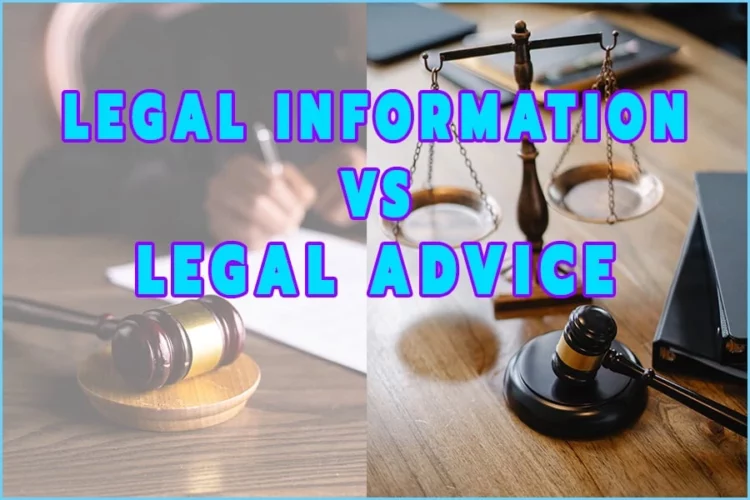You should not take Matters of the law lightly. There are numerous legal terms used today. Terms like legal information and legal advice. Both are very important in legal proceedings. However, legal advice takes precedence.
Considering the wording, one can understand why the definition is confusing. In the 21st century, access to information is easy. Especially online. Most law firms have created websites that contain general laws.
Nonetheless, everyone needs to know when they are simply consuming information and taking advice from an attorney. This article explores this topic in detail.
Legal Information Vs. Legal Advice
Legal information regards information that pertains to the general application of the law. You can learn how to navigate the legal system by looking for legal information in the public domain. You can find it in literature and online.
However, legal advice is legal counsel offered to a client. It is in line with a specific case and affects the legal liberties and obligations of the person it addresses. Only licensed and practicing lawyers should give legal advice.
Legal Information
Legal information is simply information that pertains to the general application of the law. Such information can be accessed anywhere, from printed media to the internet.
Before the internet, legal information was scarce. Only those in the legal profession had access to it.
Technology in the 21st century has made it for people, including laypeople, to access this information via websites.
Law firms have to market themselves and, in the process, create a large library of legal information through their websites.
Nonetheless, it is crucial to understand the limitations of legal information. By and large, legal information keeps you in the know about laws and their application. However, it is limited in three ways:
- Like most information, legal ones change regularly. That means that what you learned some months ago may not apply today. Thanks to new legislation and bills, legal information is constant.
- Legal information is a general look at the law. It does not apply to cases you cannot use in legal proceedings. Specific cases are complex, with more than one legal standpoint. Applying legal information will not suffice for such instances.
- Legal information is subject to an individual’s interpretation. A subjective interpretation can’t always be true and thus cannot be reliable in legal proceedings.
Legal Advice
Anyone about to file a lawsuit or is currently involved in one should get legal guidance. A law attorney provides legal counsel that is targetable to individual instances. Anyone who gives legal advice is a practicing lawyer as far as the law is concerned.
If any person knowing or unknowing, offers legal advice, they are subject to penalties under the law, especially if their ‘clients’ were ill-advised.
Characteristics Of Legal Advice
Legal advice can be differentiated from legal information by the following characteristics.
- Someone administers legal advice learned in the trade. That need to have a legal education, skill, and license to practice.
- Legal advice is meant for specific cases and can only be applied. It is arrived at by looking at the circumstances surrounding the case.
- Legal advice directly affects the rights and responsibilities of the individual involved in the case.
- Anyone who gives legal advice is under legal responsibility according to the law.
Generally, legal advice is a director. It tells the client what to do in their specific case. The details in the actions are what sets it apart from legal information.
An advice-giver is anyone representing another in legal proceedings and makes negotiations on behalf of another. It could also refer to anyone who fills out documents on behalf of another.
Apart from a licensed attorney, you can receive legal advice from law firms online. That could be through social media or their website, where they can use a question-and-answer session with a recommended in-house consultation.
Which Do I Need? Advice Or Information
Similarities Between The Two
- Legal advice and legal information are both forms of legal services. That means that you need both when facing or filing a lawsuit.
- Both are related to legal proceedings. Legal information gives a general view of how laws are applicable in legal settings. Legal advice gives details of the same.
What Are The Differences?
- Legal information is Besley on the definition of legal terms and how they are applied. Legal advice is a detailed interpretation of laws and statutes concerning specific cases.
- Anyone can provide legal information, while legal advice is limited to licensed attorneys.
- Legal information does not attract penalties. However, legal advice may lead to penalties if the client feels they were ill-advised, resulting in case dismissals.
- Most legal information is easily available online or on printed media. Legal advice usually comes at a fee. It is mostly part of the attorney’s legal fees.
- Legal information is not reliable and is subject to change. In contrast, legal advice is real-time and is offerable concerning specific cases.
When To Use Legal Advice Or Information
Legal advice and information are valuable. However, you can use one without the other. In some cases, legal information will suffice. In others, this information will lead you to seek legal advice.
Here are some tips to help you decide:
1. Risk
Examine the situation in detail. What do you stand to lose if you don’t succeed? Generally, the higher the risk, the more you need legal advice and not information. You may not be aware of the full extent of the perceived risk.
Seeking advice from an attorney seems like the best logical step.
2. Needs
Your needs will determine a lot, including whether it is advice or information. Apart from that, it can also make your spending manageable.
Some cases are detailed and will cost more than simple contract reviews. Complex cases need advice more than information.
3. Know what attorney you need
Different lawyers represent different cases. You should know that there are securities fraud lawyer, corporate lawyers, criminal lawyers, construction, etc. Know who you want for your vase before approaching anyone.
Legal Services
Legal advice is categorizable under legal services. Paying for legal services is an expensive affair.
Many defendants find themselves between a rock and a hard place regarding affordable legal fees. However, there are some free legal services that most states offer.
Public Lawyers
States have found a way to provide pro bono service. Public lawyers play a key role in providing legal services to those who cannot afford them. The judge handling the case will assign a lawyer from a public defender’s office.
These lawyers handle the case and subsequent appeals if the client wants one. However, public defense is only limited to criminal cases.
Even if you can’t afford it, the United States constitution safeguards your access to legal counsel.
Legal Aid
Public defense lawyers are limited to defense. What happens when you want to file a lawsuit? Who can help you protect your rights and interest in such a case? Legal aid clinics have made it possible for those who qualify to have legal representation.
According to their rules, they only represent the poor in society. Make sure you qualify for their services before approaching them.
They depend on limited funds from the government. That makes it difficult to represent every case they come across.
PIAs On Contingency
Personal Injury Attorneys (PIA) and a great option if you want to sue for personal injury and have no means to pay their rates.
In a nutshell, PIAs review your case first. If they believe the case has a good possibility of succeeding, they can pursue it and file charges if they win.
They charge at least 30-40% of the money received in the US. However, there are additional costs such as don’t fees incurred. That will add to the final bill received.
Pro Bono
Pro bono services are designable to help the poor in the community. Pro bono matters are frequently acceptable by lawyers who have a private practice or work for private businesses. That means they represent clients who have no means to repay them.
Just like legal aid clinics, there are certain thresholds to meet. However, you can adjust these thresholds for certain cases.
Social Injustice Lawyers
Some lawyers provide free legal services to clients who have faced social injustice. Social justice is a major issue that has its roots in the community.
Any chance of a ruling involving an aspect of social injustice will impact the individual and society.
Law School Legal Clinics
Another option for free legal services is the free legal clinic. It’s a great legal option for the poor, and it comes with its perks. Students who experienced lawyers supervise are permitted to represent clients.
Conclusion
Whatever legal service you seek, you must understand your case and needs. Going in blindly will lead to unnecessary mistakes.
Mistakes will be costly, especially if the risks are high. Seek competent legal advice from a notable attorney. We hope this article has shed some light.










